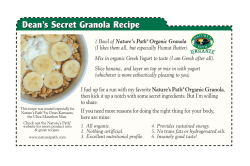
MEDIA RELEASE - Australian Organic
MEDIA RELEASE 18 March Organic grain prices skyrocket Organic millers are paying up to 40% higher premiums for certified organic grain. Supplies for organic grain are at all time low with seasonal difficulties, retiring farmers and water allocations reducing the number of growers in Australia. The shortfall has significant impacts on the grain supply chain, from human consumption to organic livestock producers, such as poultry, who are required to feed certified organic grain. Australia’s largest organic certifier, Australian Certified Organic, has held several crisis meetings with organic millers to address the issue. Australian Certified Organic is a subsidiary of Australian Organic. Chair of Australian Organic, Dr Andrew Monk, says the shortfall is worrying. He says, “The organic industry is worth $1.7billion in Australia and growing solidly. “Export demand is also high. The settings are perfect for existing operators to expand and new entrants to innovate and diversify their current cropping and marketing practices.” Craig Neale, Managing Director of family-owned Wholegrain Milling, told ABC TV’s Landline that there should be a base price of at least $500 a tonne for certified organic grain growers. He says, “What the rest of the industry thinks about that remains to be seen, but everybody needs to be profitable for this industry to survive.” A large miller in Queensland is offering 40% higher premiums for growers switching to growing certified organic grain. Farmers who are already using organic farming practices can achieve organic certification quicker under recent changes to the national organic standard. Producers could be fully certified after just one year of inspections, if they can verify that the property has been under organic management for the previous three years. Australian Certified Organic also helps producers through the certification paperwork and process. David and Mary Booth grow certified organic grain in New South Wales. Their Cootamundra property, comprising 1,240 hectares of farmland and 400 hectares of conserved bushland, was already in conversion to organic when they purchased it. They decided to take advantage of the previous owners’ investment in conversion and maintain the property as organic – largely because of Mary’s desire to be organic, although David has quickly grown to appreciate what organic can do for production and the soil, and the market advantages of organic production. David says, “We were probably ahead of our time, but organic has served us well and the markets are good.” Australian Certified Organic also makes the process of applying for certification easier. Its fee structure reduces certification costs for growers in conversion. Media: Kathy Cogo, Australian Organic, kathy.cogo@austorganic.com 0466 015 183. Images available.
© Copyright 2025









